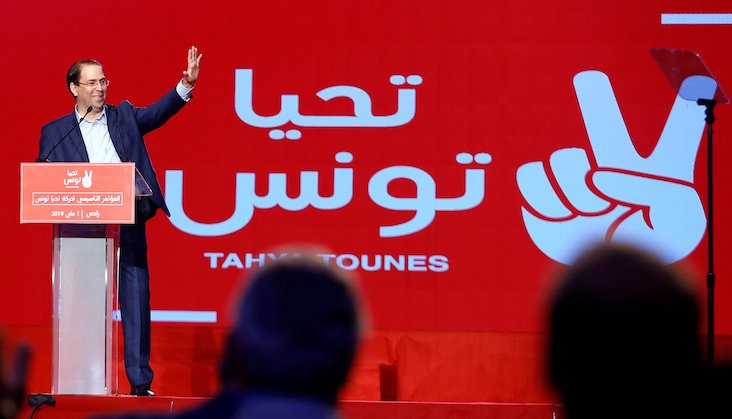
This originally appeared on TheAfricaReport.com
Tunisia is at a make-or-break stage as it prepares for elections in November 2019, with many observers starting to wonder if the country’s political transition to liberal democracy is in trouble.
The North African country is in constant angst, with the state of emergency yet again extended on 5 June for another month to early July. The country has been under this cloud of fear since June 2015. The state of emergency ended in October 2015 but was reinstated the next month after a suicide bombing killed 12 presidential guards.
An incessant state of emergency (and anxiety) does not bode well for readiness and safety ahead of the key parliamentary and presidential elections. The state of emergency gives officials additional powers to curtail certain freedoms and civil rights in the interest of preserving order (and stability in the greater scheme of counterterrorism efforts). Such curtailments make sense but also have underpinned failed states when sustained over an extensive period.
Appreciating Tunisia’s successes
Tunisia remains the cradle of the Arab Spring. After fruit vendor Mohamed Bouazizi set himself on fire in a vivid one-man protest outside a government office in December 2010, protestors took to the streets of the vendor’s hometown, Sidi Bouzid. By the time Bouazizi died in hospital a few weeks later, the blaze from that disturbing scene had sparked an uprising against long-time president Zine El Abidine Ben Ali, followed by a series of other revolutions in the Middle East.
The protests led Ben Ali to resign and flee to Saudi Arabia. Under a transitional government, Tunisia drafted and adopted a new constitution in January 2014 and held its first parliamentary elections under the new constitution in October 2014, in which the secularist Nidaa Tounes party and moderate Islamist Ennahda emerged as the two largest political parties and power brokers in a national unity government. In the aftermath of Ben Ali’s dictatorial style, the coalition was (and still is) a representation of the change imagined for the region.
The coalition was (and still is) a representation of the change imagined for the region
More than five years after 2014 elections, Tunisia’s political record should be appreciated for what it has accomplished compared to other regional powers. In Egypt, protests in Tahrir Square brought down Hosni Mubarak in February 2011. After a democratic election delivered power to Mohamed Morsi, a member of the now-banned Muslim Brotherhood, military leader Abdel Fatah al-Sisi seized power through a coup with many international parties (including the US) turning a blind eye. Sisi remains in power to this day with critics saying things remain the same as 2011.
Protests in Libya in 2011 also quickly turned into a revolution against dictator Muammar Gaddafi. The civil war culminated in the killing of Gaddafi with his body dragged through the streets. These macabre triumphs rapidly went sour when the rebels turned against each other. The country remains split into factions; oil production (and consequently revenue) is volatile and human trafficking is rampant due to the massive migrant situation. In Yemen, protestors ousted President Ali Abdullah Saleh after 30 years in power. The country, however, remains engulfed in conflict as Saudi Crown Prince Mohammed bin Salman continues to fight back Iranian-backed Houthi rebels.
Jobs, unemployment and extremism
To Tunisia’s credit, democracy remains in place. Yet authorities still struggle to jumpstart the economy, combat youth unemployment and subdue extremism. The economic troubles are gradually dragging Tunisian politics back to a binary discussion on Islamic and non-Islamic rule. The political elite and insiders are concerned that the convergence of many factors may force the country back to 2011.
The Tunisian dinar has depreciated more than 30% against the US dollar since 2016, while annual inflation hovers around 8%. The cost of living has skyrocketed, rising more than 30% since 2016. Imports from Europe also weigh heavily on the economy as the Tunisian dinar has also plummeted 40% against the euro.
The economic troubles conflate with the conspicuous tensions between President Béji Caïd Essebsi and Prime Minister Youssef Chahed. After leaving Nidaa Tounes (of which President Essebsi remains a member), Chahed has now formed his the Long Live Tunisia political party. The patronage system in the country, particularly in the public administration, state-owned companies, and government offices and agencies in the capital and provinces, remains at the centre of tensions as Nidaa Tounes seeks to solidify power.
The escalating battle over resources in Tunisia could develop into a major fight for several reasons. First, financial resources (including public-sector jobs) in the country are limited. GDP growth continues to push towards 3% with increasing consumption and slightly improving exports. Yet a bigger eruption of growth is required to jumpstart the country and create jobs. In addition, investment is still weak and tourism remains a fragile sector (always concerned with any talk of terrorism that could quickly empty the beaches in the country).
Competition for state resources will only intensify in the run-up to the elections
The competition for access to state resources – revenue, jobs, etc. – will only intensify as leaders search for ways to appeal to their electorate, particularly the numerous unemployed youths, in the run-up to the November elections. This conflict is partially the reason for the authorities’ failure to push through structural reforms. The focus on consensus and coalition, for example, ensures that parties avoid the necessary restructuring of the public sector. As a result, pension reform has been slow and the country is paying more than expected for cash transfers to its most vulnerable citizens. Voluntary departure schemes also have not been as successful. This is partially good because it means less spending for the government, but it also means fewer job openings for the large group of unemployed Tunisians.
In reality, reducing the size of the public sector and fighting corruption does not necessarily support coalition growth (as sharing the spoils of war or patronage is, sadly, key in coalition building). As a result there has been little redirecting of public funds towards private-sector stimulus mechanisms. Borrowing more to fund expansionary efforts in the private sector is a limited option with many risks.
Next steps
Moving past the consensus model remains a process for this country. Strengthening political parties is also crucial. Nidaa Tounes may not survive the 2019 elections, especially as the state of emergency is increasingly attached to the ruling party. The country also requires greater institutional reform with funding to strengthen civil society. Although Tunisians strongly believe in and support their civil society, greater financial resources and legislative support is required to push the country towards a successful election in November, as well as to boost local institutions and authorities post-election in implementing economic and political changes under larger decentralisation efforts.
The future of the country – and hope for the Arab Spring – is very much tied to the 2019 elections. These elections will be the second democratic presidential and parliamentary elections for the country, provided the state of emergency is lifted to facilitate them. The sad reality of politics is that it is hard to buy into a democracy until the party that assumes power in the transition loses an election and hands over power*. That said, a greater reality in politics is that if there is no election (due to the state of emergency or a related matter), citizens lose all faith in the country’s institutions. A death of faith here would ultimately be the death of the Arab Spring.
* The author would like to point out that he is not predicting a winner in the forthcoming election or calling for a change of party.
